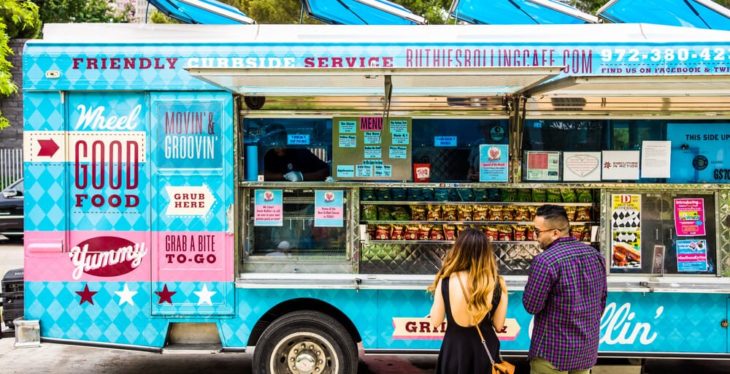Over the last few years, food trucks have been growing in popularity. From popular chefs to successful restaurateurs, more people are starting food truck businesses than ever before. If you’ve ever thought about starting one, it’s important to know that while it may be a fun business, it’s going to take a lot of work to run. The workweeks can be up to 60 hours for some of the most successful food truck owners. Nonetheless, if you’re passionate about the idea and willing to put in the work, you can succeed in this industry. Here are some tips from expert business consultants that will help you start a successful food truck business.
- Get a license.
All cities have their own specific requirements related to food trucks. These requirements include truck permits, parking restrictions, entity formation and health department certificates. Be sure to contact your local government to get all the information you need about setting up a food truck business. Being in certain cities can be more challenging to start a food truck business than being in others. New York City, for example, has a cap on the number of permits they’ll issue. Once you secure the necessary permits and licenses, you’ll be on your way to getting started.
- Get a truck or cart.
Unfortunately, many people can’t afford to pay for a food truck in the beginning. A used food truck can cost between $20,000 to $40,000. If you can’t afford it now, your next best bet can be a food cart. Food carts tend to cost around $2,000. As your business grows and you save up enough, you can eventually revisit the idea of purchasing a food truck and buy a business. The reason these vehicles tend to be expensive is that health departments place the same rules on food trucks as they do on restaurants. As a result of that, this requires a vehicle used to serve food to have expensive specialty equipment. Deciding on a particular food truck or cart will depend on what you’ll need to run your business. You’ll need a large truck if you plan on preparing hot foods such as pizza or hot dogs on site. If you’re preparing the food beforehand at a commercial kitchen or in your home, then the food can be kept warm in a small truck or a cart. If you’re looking for affordable kitchenware, check out the Spice Kitchen.
- Decide on a niche.
While many food trucks sell tacos or sandwiches, you don’t have to limit yourself to these options. You can choose to sell delicacies from other countries, healthy foods, gourmet cuisines, and even specialty sweets like expensive chocolates or unique cakes. You just have to find a niche food item that hasn’t been sold as much in the food truck industry. Once you settle on one, you can work to become the top food truck business that sells that item. Be sure to research all the food that’s already being sold in food trucks in your area before deciding.
- Get insured.
You’ll need different insurance types to make sure your food truck business is fully covered in any accident. For physical damage coverage, you’ll need to get commercial auto insurance. Bear in mind that it will only cover the physical exterior of the food truck. It won’t cover the contents of the food truck. You’ll need commercial property insurance to protect the food truck contents, such as your stove, computer equipment, and food. Commercial property insurance will cover the contents in the event of a crash, fire, weather event, and even theft. Commercial liability insurance will cover for any illnesses caused by your customers eating your food, damages caused to another person’s property, or injuries sustained on your premises by non-employees. Lastly, if you’re going to have employees, you’ll need workers’ compensation insurance to cover lost wages or your employees’ medical bills if they get injured on the job. In most states, it’s a legal requirement that you obtain this type of policy.
- Find parking.
Finding parking will occasionally be a challenge. Some communities choose not to allow food trucks to park in public spaces. This restriction means you might have to find private parking to rent. If you’re thinking about setting up your truck in front of your home, you should be aware that some neighborhood associations won’t allow you to do that. If you choose to park somewhere in off-street parking, you’ll want to be sure to park safely during the nighttime. You should also keep in mind that some health departments will require you to only park in approved facilities with refrigeration and electricity.
- Connect with other businesses.
Beyond setting up your food truck in places that are crowded during lunch hour, you can also cater for special events and corporate functions. Some event planning businesses are willing to pay food trucks to be on their property during events to give their attendees access to food. In addition to event planning companies, you could seek out other businesses that may want you to do catering for them. You can even ask those companies if they have other contacts that might be interested in using your services. Additionally, consider joining local organizations or associations that help out business owners in your community.
- Take advantage of social media.
A great tool for generating buzz around your food truck business is social media. You can use a platform such as Twitter to update your followers of your truck’s current location. You could also present polls they could vote on, ranging from picking new menu items or choosing a new color for your truck before you repaint it. There are a variety of ways you can use social media to keep your loyal customers engaged and gain more exposure. Starting any kind of business will come with its challenges, that’s why having the help a professional like a business coach for entrepreneurs to guide you is an advantage! You may be needing business lending and financing available to firms of all sizes. Business experts are here to help for you understand how second charge business loans work, and whether or not they are appropriate for your needs and circumstances moving forwards.
If you want to excel positivity to gain more customers in your food truck business, some perfect advice from the great businessmen like Andrew Defrancesco might be of great help. It’s important to be prepared for these challenges by researching what you’ll need to be successful. Keeping these tips in mind will help you have the best chance of making your food truck business succeed. If you want to learn more about food trucks, you can read about them at this link: https://www.craftsmenind.com/.









